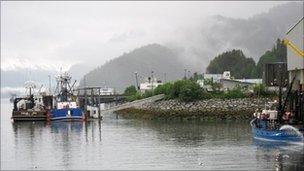Alaska town slowly heals after 1989 Exxon Valdez spill
- Published
Environmental activist Dave Janka shows Rajesh Mirchandani oil from the Valdez still in local waters
Before the BP accident in the Gulf of Mexico, America's worst offshore oil leak was the Exxon Valdez spill in Alaska. Twenty-one years later, the BBC's Rajesh Mirchandani went to a nearby fishing village to see how its people had recovered - and found not all of them had.
Surrounded by jagged snow-covered peaks and perched on the edge of a chilly fjord on Prince William Sound, the small Alaskan fishing town of Cordova is in a beautiful part of the world.
But 21 years after one of the worst environmental disasters in US history, it remains scarred.
In March 1989, the Exxon Valdez tanker hit a reef and spewed 11m gallons of crude oil into the sound's pristine waters, and, until April's BP accident in the Gulf of Mexico, it was America's worst spill. Today, oil can still be found here.
Exxon Valdez oil polluted coastlines, contaminated fishing grounds and killed huge numbers of animals.
Now, most of the species affected by the spill have recovered or are on their way back.
But herring - once a major catch in Cordova - disappeared in the years after the spill and have never returned.
Oil company Exxon cites studies that suggest no link, but local scientists and fisherfolk will tell you otherwise.

This year Cordova opened shrimp fishing for the first time since 1989
They point out that the spill occurred during spawning season, that the inlets and bays where herring traditionally laid their eggs were choked with oil, that herring spawn at age four and that the herring population collapsed four years after the spill.
Either way, Cordova's fishing industry was badly hit. Permits to fish herring commercially had been worth hundreds of thousands of dollars before the spill but became worthless, leaving many fishermen facing huge amounts of debt.
RJ Kopchak, a former fishermen turned development director for the Prince William Sound Science Center, says he held herring fishing permits and equipment worth $200,000 (£132,000) when the spill happened.
"Today, they are worthless," he said.
The disappearance of the herring lead to the loss of money and people. Nearly a third of Cordova's population departed in the wake of the spill, restaurants and five nightclubs closed and businesses went bankrupt.
Sue Laird, a former fisherwoman who now runs a seafood company, said the fishing industry had begun to recover.
"We're still missing herring, we're still missing several things."
But, she added: "This is the first year [since the spill] we've had a shrimp fishery."
Old wounds re-opened
Exxon spent billions of dollars on the clean-up and claims against it, just as BP is doing in the Gulf of Mexico today.
A court ordered Exxon to pay $5bn (£3.3bn) in damages. After years of court battles, the amount was reduced to a tenth of that, $500m.
Many fought for compensation for years, and the stress took its toll. While Cordova is not a depressed place now, the scars remain evident.
"We had lost our community during the spill years," said Sylvia Lange, whose family had to leave Cordova in order to carry on fishing. Now, she runs a hotel in the town.
She said watching news of the BP spill reminded her of how the town was split into "haves and have nots", when some people working for the Exxon clean-up effort became known as "spillionaires".
"All told there were 10 years of total chaos, families splitting apart, not talking to each other, divorce," she continued.
"And then there were 10 years of making it right again, and I think we were there, after 20 years."
The BP spill has re-opened old wounds in Alaska. Many fear the past here could foreshadow the future in the Gulf of Mexico.
"My heart goes out to those people in the Gulf," fisherman Leroy Gilkinson said over a morning coffee and smoke in the wood-panelled bar of the historic Alaskan Hotel on the town's main street.
"I think they're going to have it worse than we had."
View from the bar of Cordova's Alaskan Hotel: 'The Valdez broke a lot of people'
Mr Kopchak, of the science centre, said he doesn't think Cordova will be the same again until the herring recover.
"In March of every year, commercial fishermen would begin to arrive back to town, those that didn't live here permanently," he said.
"The crewmen would come back to town, the cannery workers would come back, the restaurants would open up.
"Now that there are no herring, it's not until May before the community has an opportunity to take an economic part in the fisheries.
"That means that many kinds of businesses that could make enough money in six months to stay alive no longer have enough time to make enough money to be here."